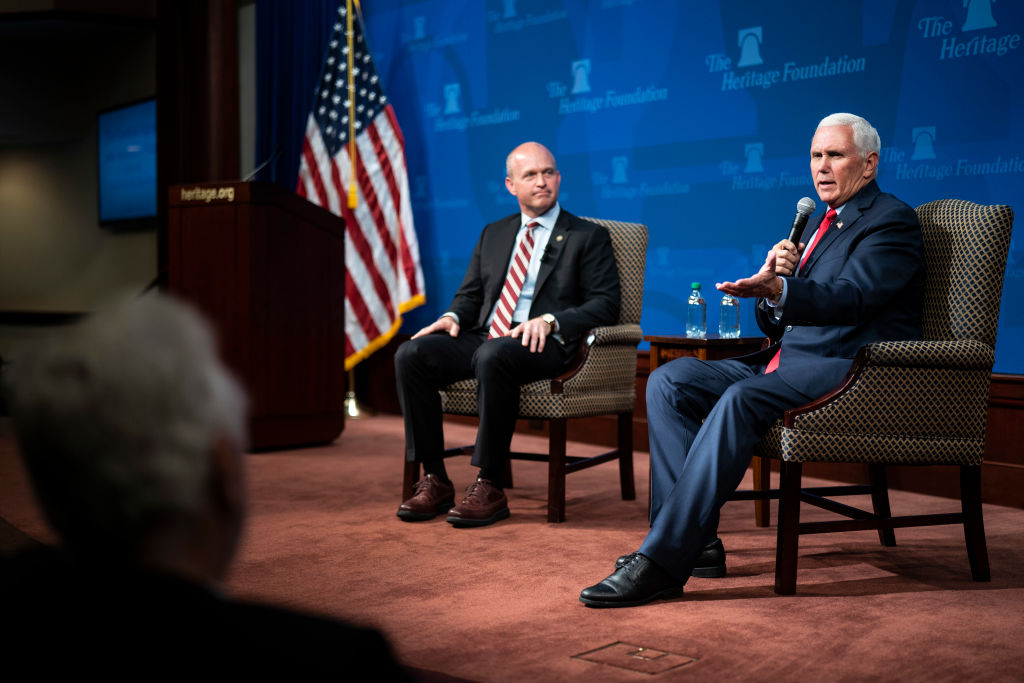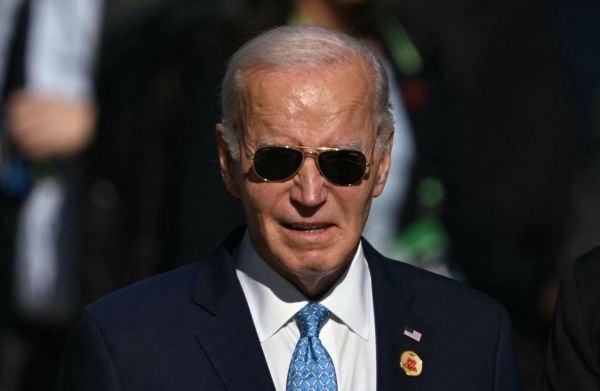I warned you a few weeks ago that a civil war on the right over Ukraine was coming, didn’t I?
Well, it’s here. And by “here,” I of course mean “in Italy.”
Yesterday Italian media reported that former Prime Minister Silvio Berlusconi, a key player in the country’s new coalition government, was caught on tape blaming Russia’s war on its victims. It was Ukrainian brutality in the Donbas that compelled Moscow to intervene, he told his audience, framing the invasion as a sort of humanitarian intervention.
He also related how his friend Vladimir had recently sent him 20 bottles of vodka and “a very kind letter” for his birthday, as soft-hearted humanitarians are wont to do.
Giorgia Meloni, the incoming prime minister, was mortified. Like Berlusconi, Meloni is a member of the Italian right and poised to lead the most conservative government the country has had since World War II. Wary Western liberals have wondered whether she’s a closet fascist who’ll be coming out of the closet once she takes power.
She doesn’t sound like a fascist, though. “Italy is fully, and proudly, part of Europe and of NATO,” Meloni said on Wednesday in response to the Berlusconi audio. “Anyone who does not agree with this cornerstone will not be able to be part of the government, even at the cost of not forming a government.” Her statement followed a public pledge of “support for the cause of freedom of Ukrainian people,” a phone call with Volodymyr Zelensky reiterating that Italy won’t recognize Russia’s sham referendums in the occupied provinces, and a pledge of more weapons for Ukraine’s military.
Meloni versus Berlusconi. We’ll call that the Italian front in the right-wing war over Ukraine.
The American front is shaping up too, as you may have heard. Here’s Mike Pence in a speech at the Heritage Foundation:
“Now, I know there is a rising chorus in our party, including some new voices to our movement, who would have us disengaged with the wider world,” Pence said. “But appeasement has never worked, ever, in history. And now more than ever, we need a conservative movement committed to America’s role as leader of the free world and as a vanguard of American values.”
“As Russia continues its unconscionable war of aggression to Ukraine, I believe that conservatives must make it clear that Putin must stop and Putin will pay,” he added. “There can be no room in the conservative movement for apologists to Putin. There is only room in this movement for champions of freedom.”
I’m not sure Mike Pence is in a position to tell the “Hang Mike Pence” party what sort of character it does and doesn’t have room for. But in case his message to the Heritage Foundation wasn’t clear, he swung by Fox News later in the day to argue that America should be the “arsenal of democracy” in Ukraine and elsewhere.
Pence was responding to what House Minority Leader Kevin McCarthy said recently about not cutting “blank checks” to Ukraine after the new Republican majority takes power, unwitting encouragement from the future speaker of the House for Putin to keep fighting through winter. Those remarks reportedly stunned the Ukrainian leadership, who were assured by McCarthy himself weeks ago that support for Ukraine will remain a top priority for Republicans.
Kevin McCarthy, talking out of both sides of his mouth? I’m as shocked as you are.
But back to Pence. Mike Pence spent four years appeasing an authoritarian in his role as vice president except on one very memorable occasion. That occasion aside, he isn’t prone to defying his former running mate’s nationalist base. Yet here he was on Wednesday all but declaring war on the GOP’s Putin simps. We must not “be led astray by the siren song of unprincipled populism that’s unmoored from our oldest traditions and most cherished values,” he said at one point in his remarks at Heritage, sharpening his critique (without sharpening it so much as to utter the word “Trump,” of course).
What gives? What has Pence feeling so emboldened lately?
I think he realizes righty populists are running out of excuses to pull the plug on Ukraine.
The conventional wisdom, with which I agree, is that Putin’s best option for a not-disastrous result is to play for time. So long as Western aid continues to flow to Kyiv, his army is unlikely to regain the offensive. Solution, then: Shift to a defensive fight, aim for a winter stalemate, and wait for the West to grow impatient and fracture. Americans will resent seeing Washington plow billions more into Ukraine to no effect. Europeans will resent having to shiver through the winter because they now lack access to Russian gas. Nationalists here and abroad who are keen to salvage a face-saving outcome for Putin will point to the stalemate as proof that the war is unwinnable and it’s time at long last to ditch the Ukrainians.
Alternatively, Putin could get extra aggro and try to scare the West into backing off. He’s alluded to using nuclear weapons in Ukraine, but there’s no evidence of Russia moving toward doing so. Until it does, the nuclear bluster is just that, bluster. But if he were to suddenly order tactical nukes to be moved to the Ukrainian border, say, that would imply that he means business. Western governments would panic; influential figures would insist that capitulation is the only way to avert global nuclear war. Some NATO allies might conclude that to continue sending weapons to Ukraine with a nuclear sword of Damocles overhead would be reckless.
In sum, to crack the enemy’s morale, Russia should want the West feeling either bored with the war or terrified of it.
The strategy they’ve pursued lately seems designed to do the opposite.
Bombing civilian centers indiscriminately is a good way to outrage Ukraine’s allies without scaring them, leaving them neither bored nor terrified. Russia has been killing Ukrainian noncombatants since the start of the war, of course, but until recently there was a fiendish sort of strategic logic to doing so. So long as Russian troops were advancing, or stood a reasonable chance of advancing, terrorizing the locals might conceivably demoralize Ukraine into submission.
After the Ukrainian army’s lightning advance through Kharkiv and its recent gains in Kherson, the complexion of Russian terror is different. No longer is there any “strategy” behind it, to the extent there ever was. On the contrary, it’s idiotic for Moscow to waste hundreds of millions of dollars in high-tech weapons on ineffectual strikes on Kyiv when its forces are hurting for munitions. To resort to out-and-out terrorism at this stage, with the Russian army in retreat, reeks of frustration that Russia can’t win on the battlefield and so must content itself with wantonly killing Ukrainians by whatever available means.
“Putin begin this war by saying that he was trying to save his brothers and sisters from a Nazi regime,” wrote the Atlantic’s Tom Nichols. “Now he’s going to kill and torture and murder those same brothers and sisters like a Nazi on a decimation bender for refusing to accept his beneficent liberation.” The more nakedly homicidal Russia’s intentions are, the stronger the moral case for supporting Kyiv gets. And the harder it becomes for Russia simps in the West to agitate against that support.
Some speculated that the missile attacks on Kyiv were payback for the mysterious explosion on the Kerch Bridge that connects Russia to Crimea. But savvier types believe it was less tit-for-tat than a case of a nervous Putin trying to placate the ultra-nationalists at home who keep egging him on to be ever more ruthless in pursuit of victory. He rode the nationalist tiger to power in Russia and is discovering now that its appetite for Ukrainian blood is even more depraved and insatiable than his is. That includes figures on the battlefield …
… and in the Duma …
… and all across Russian media.
If he doesn’t feed the tiger, the tiger might feed on him. Killing Ukrainians randomly won’t get Russia closer to its military goals but it will keep the tiger fed for a while.
Thanks to clips like those above, though, the average American and European has never had a better sense of the bloodlust of Russian propaganda than they do right now. Julia Davis and other Russian media watchdogs have become a phenomenon on social media, pulling back the curtain on the messages about the war to which Putin’s domestic audience is regularly exposed. As public awareness of those messages grows, the task of Western populists to pressure Ukraine into surrender gets harder. It’s easy to dismiss American hawks as hysterics for insisting that the war will end in genocide absent U.S. support—until you see Russian goons confirming those suspicions in their own words.
No wonder 70 percent of Ukrainians support fighting until the bitter end.
Social media has hurt Russia in another important way. Putin’s recent mobilization of conscripts was designed to intimidate Ukraine and the West, reminding them that Moscow can overwhelm an enemy with sheer manpower when it decides to do so. If the Western alliance intends to win, it had better settle in for a long war against a formidable force. The reality of the mobilization, however, is different.
Evidence of [conscripts’] lack of training is anecdotal, but the sheer number of videos from across Russia, along with scattered threats from draftees to strike over the conditions, other news reports and commentaries, underscores the depth of the problems.
In one widely circulated video, a recruit from Moscow assigned to the First Tank Regiment—a storied unit hit hard early in the invasion—said that the regimental commander had announced that there would be no shooting practice or even theoretical training before the men deployed.
Another video showed a group of about 500 disheveled men, most of their faces covered by balaclavas, standing by a train in the Belgorod region, near the border with Ukraine. The narrator said that they had not been assigned to specific units, had lived in “inhuman conditions” for a week, had to buy their own food and lacked ammunition.
Some videos circulating show the relatives of conscripted men passing equipment to them that they bought with their own money because the Russian defense ministry lacks the funds or the logistical wherewithal to supply them. Other clips show Russian men being snatched off the street seemingly willy-nilly by military “press-gangs” to help meet the mobilization quota. The astounding number of men who have been impressed or drafted, who have fled the country, or who have gone into hiding to avoid conscription has turned Russia into a “country of women” per one local.
One Russian journalist has gone as far as to say that the shambolic mobilization on top of the military’s shambolic performance in Ukraine has broken the social contract between Putin and his subjects in which he guarantees stability and national greatness and in return they let him do what he wants. It’s all playing out day by day on Telegram, Twitter, and other platforms used by millions of people. So much for intimidating the Western alliance, and so much for Russia apologists using the mobilization as grounds for believing the war is lost. If anything, thanks to social media, Russia looks weaker now than it did before the draft notices went out.
You can imagine Mike Pence watching all of this and sensing a rare opportunity to align himself with a majority of the Republican Party against Trump and the isolationist wing in the next primary. The anti-anti-Russia crowd punches above its weight on the right because populists dominate conservative media but, at last check, two-thirds of GOP voters supported backing the Ukrainians until Russia is ousted. Hawks have the momentum for now, and an old pro like Pence surely knows it and is keen to take advantage.
Granted, there’s still much Putin could do to give Western authoritarians reason to press the case for Ukrainian capitulation, but lately he seems incapable of doing any of it. If his mobilization were going well, they could warn about a surge of macho Russian super-soldiers turning the tide of the war—but it isn’t going well. If his army were advancing, they could claim that Ukraine’s defeat is inevitable—but his army is retreating. If his military were outmaneuvering the Ukrainians, they could argue that U.S. aid is being wasted—but his military is being outmaneuvered. If Russia were expanding its influence regionally, they could say that Washington is foolish to alienate a great power—but it’s losing influence. If Putin were prepared to use nuclear weapons, they could demand surrender in the name of preventing Armageddon—but he’s not preparing. (Yet.) If Putin were to sue for peace, they could plead that it’s immoral to keep funding the Ukrainian war machine—but he isn’t doing that either. (Yet.)
It’s going so badly for Russia that Francis Fukuyama took an “end of history” victory lap over the state of the war a few days ago, for cripes’ sake.
Under the circumstances, House Republicans defunding Ukraine would look less like putting “America First” by refusing to throw taxpayer money down a foreign sinkhole than deliberately derailing a Ukrainian victory in order to bail Putin out of a richly deserved humiliation. Good for Pence for calling it out, showing backbone in service to a good cause. His political and moral instincts are correct in this case.
I just hope he’s not so deluded as to believe that this will help him in 2024. Mike Pence will never lead the “Hang Mike Pence” party, alas, but old dreams die hard. Until he learns that the hard way from Republican primary voters, we must indulge him as he continues to dream.









Please note that we at The Dispatch hold ourselves, our work, and our commenters to a higher standard than other places on the internet. We welcome comments that foster genuine debate or discussion—including comments critical of us or our work—but responses that include ad hominem attacks on fellow Dispatch members or are intended to stoke fear and anger may be moderated.
You are currently using a limited time guest pass and do not have access to commenting. Consider subscribing to join the conversation.
With your membership, you only have the ability to comment on The Morning Dispatch articles. Consider upgrading to join the conversation everywhere.